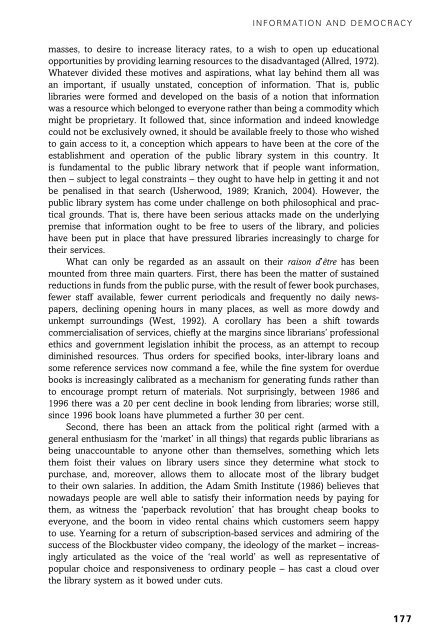Theories of the Information Society, Third Edition - Cryptome
Theories of the Information Society, Third Edition - Cryptome
Theories of the Information Society, Third Edition - Cryptome
You also want an ePaper? Increase the reach of your titles
YUMPU automatically turns print PDFs into web optimized ePapers that Google loves.
INFORMATION AND DEMOCRACY<br />
1<br />
1<br />
1<br />
2<br />
1<br />
1<br />
masses, to desire to increase literacy rates, to a wish to open up educational<br />
opportunities by providing learning resources to <strong>the</strong> disadvantaged (Allred, 1972).<br />
Whatever divided <strong>the</strong>se motives and aspirations, what lay behind <strong>the</strong>m all was<br />
an important, if usually unstated, conception <strong>of</strong> information. That is, public<br />
libraries were formed and developed on <strong>the</strong> basis <strong>of</strong> a notion that information<br />
was a resource which belonged to everyone ra<strong>the</strong>r than being a commodity which<br />
might be proprietary. It followed that, since information and indeed knowledge<br />
could not be exclusively owned, it should be available freely to those who wished<br />
to gain access to it, a conception which appears to have been at <strong>the</strong> core <strong>of</strong> <strong>the</strong><br />
establishment and operation <strong>of</strong> <strong>the</strong> public library system in this country. It<br />
is fundamental to <strong>the</strong> public library network that if people want information,<br />
<strong>the</strong>n – subject to legal constraints – <strong>the</strong>y ought to have help in getting it and not<br />
be penalised in that search (Usherwood, 1989; Kranich, 2004). However, <strong>the</strong><br />
public library system has come under challenge on both philosophical and practical<br />
grounds. That is, <strong>the</strong>re have been serious attacks made on <strong>the</strong> underlying<br />
premise that information ought to be free to users <strong>of</strong> <strong>the</strong> library, and policies<br />
have been put in place that have pressured libraries increasingly to charge for<br />
<strong>the</strong>ir services.<br />
What can only be regarded as an assault on <strong>the</strong>ir raison d’être has been<br />
mounted from three main quarters. First, <strong>the</strong>re has been <strong>the</strong> matter <strong>of</strong> sustained<br />
reductions in funds from <strong>the</strong> public purse, with <strong>the</strong> result <strong>of</strong> fewer book purchases,<br />
fewer staff available, fewer current periodicals and frequently no daily newspapers,<br />
declining opening hours in many places, as well as more dowdy and<br />
unkempt surroundings (West, 1992). A corollary has been a shift towards<br />
commercialisation <strong>of</strong> services, chiefly at <strong>the</strong> margins since librarians’ pr<strong>of</strong>essional<br />
ethics and government legislation inhibit <strong>the</strong> process, as an attempt to recoup<br />
diminished resources. Thus orders for specified books, inter-library loans and<br />
some reference services now command a fee, while <strong>the</strong> fine system for overdue<br />
books is increasingly calibrated as a mechanism for generating funds ra<strong>the</strong>r than<br />
to encourage prompt return <strong>of</strong> materials. Not surprisingly, between 1986 and<br />
1996 <strong>the</strong>re was a 20 per cent decline in book lending from libraries; worse still,<br />
since 1996 book loans have plummeted a fur<strong>the</strong>r 30 per cent.<br />
Second, <strong>the</strong>re has been an attack from <strong>the</strong> political right (armed with a<br />
general enthusiasm for <strong>the</strong> ‘market’ in all things) that regards public librarians as<br />
being unaccountable to anyone o<strong>the</strong>r than <strong>the</strong>mselves, something which lets<br />
<strong>the</strong>m foist <strong>the</strong>ir values on library users since <strong>the</strong>y determine what stock to<br />
purchase, and, moreover, allows <strong>the</strong>m to allocate most <strong>of</strong> <strong>the</strong> library budget<br />
to <strong>the</strong>ir own salaries. In addition, <strong>the</strong> Adam Smith Institute (1986) believes that<br />
nowadays people are well able to satisfy <strong>the</strong>ir information needs by paying for<br />
<strong>the</strong>m, as witness <strong>the</strong> ‘paperback revolution’ that has brought cheap books to<br />
everyone, and <strong>the</strong> boom in video rental chains which customers seem happy<br />
to use. Yearning for a return <strong>of</strong> subscription-based services and admiring <strong>of</strong> <strong>the</strong><br />
success <strong>of</strong> <strong>the</strong> Blockbuster video company, <strong>the</strong> ideology <strong>of</strong> <strong>the</strong> market – increasingly<br />
articulated as <strong>the</strong> voice <strong>of</strong> <strong>the</strong> ‘real world’ as well as representative <strong>of</strong><br />
popular choice and responsiveness to ordinary people – has cast a cloud over<br />
<strong>the</strong> library system as it bowed under cuts.<br />
177
















